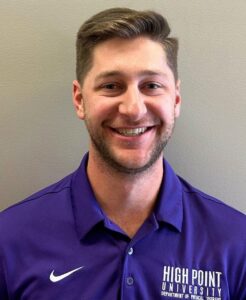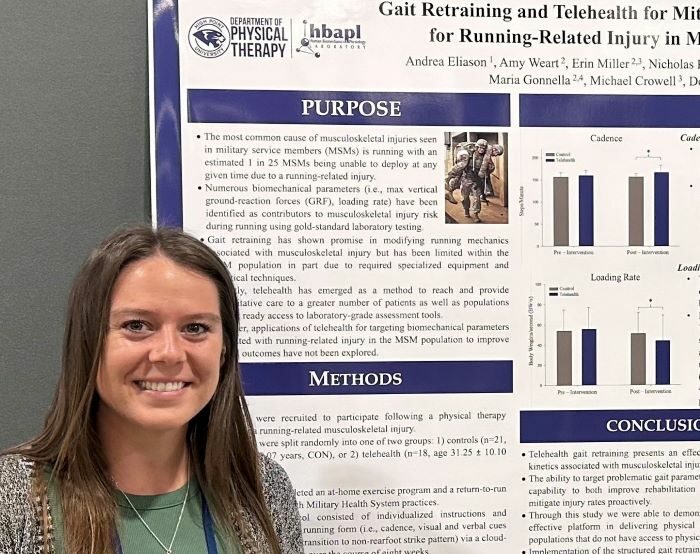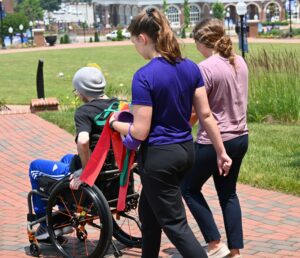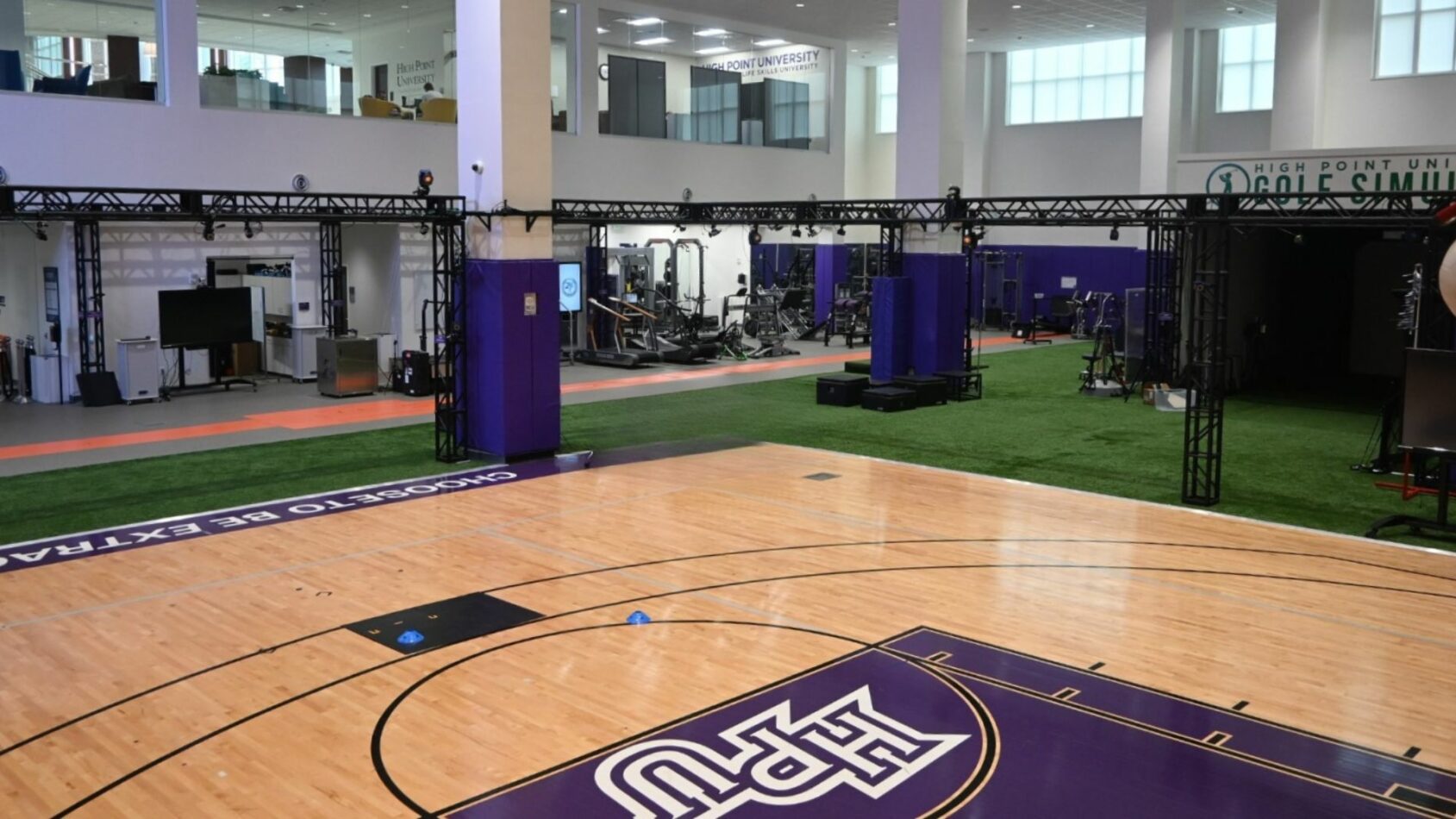
“The High Point University Doctor of Physical Therapy program is unlike any other. Students are exposed to extraordinary opportunities to differentiate themselves as physical therapists. Whether through innovative curriculum looking at physical therapy as it is going to be, early and often clinical education to promote hands on learning, selective courses for students to more further explore their areas of interest, or research opportunities, HPU DPT trains our students to become our next best colleague.”
Dr. Jeff Taylor
PT, PhD, DPT, CSCS
Department Chair

About HPU's Doctor of Physical Therapy Program
Ready to apply?
Contact Bronwen Gainsford


Grant Goodson, PT, DPT, COMT
HPU DPT Class of 2022
“I thoroughly enjoyed my time as a student in High Point University’s Department of Physical Therapy program. The program not only equipped me with the knowledge needed to pass the board exam but also provided me with the clinical reasoning and hands-on experience required to become a proficient clinician. As I embarked on my sports residency and sought to deepen my expertise, I quickly realized that the HPU DPT curriculum had already laid a solid foundation for pursuing specialty certifications, such as the SCS. I am grateful to the HPU DPT program for setting me up for success and paving the way for my career advancement.”

Monifa Williams PT, DPT, OCS
HPU DPT Class of 2020
“Three years after graduating from HPU’s DPT program, I am grateful for my thorough education. The curriculum was comprehensive, but the variety of clinical experiences and selectives I had the opportunity to experience at HPU has impacted my career. I felt incredibly prepared for clinical practice after graduation and well equipped not only in my clinical practice and with my clinical reasoning but also when preparing for my Orthopedic Clinical Specialist Board Certification. I often felt overprepared when studying and taking the exam, which I would give a lot of credit to my extensive education at HPU.”


• Extracurricular OPPORTUNITIES for students in research, clinical practice, & community engagement
• Caring PEOPLE that foster a family-like atmosphere
• Forward thinking
Pre-Requisite Courses (minimum)
| Ninja Column 1 | Ninja Column 2 |
|---|---|
| Required Courses | Credit Hours |
| Human (preferred) or Vertebrate Anatomy (lecture and lab) | 3 |
| Human (preferred) or Vertebrate Physiology (lecture and lab) | 3 |
| Biology I and II sequence (lecture and lab) | 8 |
| Chemistry I and II sequence (lecture and lab) | 8 |
| Physics I (lecture and lab) | 4 |
| Physics II (lecture and lab) or upper-level (200/2000 level and above) Human Biomechanics with Lab | 4 |
| Statistics (Biostatistics preferred) | 3 |
| Psychology (Abnormal and Developmental Psychology recommended) | 3 |
| Applied Sciences - Psychology II or Nutrition, Advanced Physiology, or Advanced Exercise Physiology | 3 |
| English Composition/Writing | 3 |
Applicants with more than 3 prerequisites to complete within one year of matriculation OR more than 1 prerequisite to complete during the spring semester prior to matriculation in the DPT Program will not be considered for admission.
The High Point University DPT program does NOT accept transfer credits from other physical therapy programs.
Credential Evaluation (if applicable): For all work completed in a college or university outside the United States, a detailed credential evaluation (showing English translation of courses, grades, GPA, degree equivalency, and more) must be sent directly to the Graduate Admissions Office of High Point University from an appropriate agency.
GRE
GRE scores are not required for admission; however, they are recommended for applicants with a science GPA of <3.3. If you choose to submit scores, they must be from within five years of the date of your application to the DPT program. The High Point University Department of Physical Therapy’s GRE code is 7368.
Experience in the Physical Therapy Profession
There is no minimum requirement for volunteer/work hours. 100 hours of volunteer time or paid work in varied PT practice is recommended.
Letters of Reference
All applicants are required to submit three letters of reference. It is highly recommended that at least one reference come from a professor and one from a licensed physical therapist. Letters of reference from a friend or family member will not be reviewed.
Interviews
Interviews are required for admission to the program. Through one-one-one interviews with faculty, students show their ability to interact and communicate with others, develop relationships, and carry themselves in a professional manner. We want a glimpse in to you as a future clinician!
Before Entering the DPT Program:
The candidate must have completed all pre-requisites, have earned a minimum of a bachelors degree from an accredited college or university or its equivalent, passed a background and sex offender check, passed a drug screen, confirmed that they meet the technical standards, and completed all application materials. Failure to pass these background checks or to meet the technical standards will not allow you to successfully complete the program and therefore, entry into the program would not be prudent.
Technical Standards for Admission
Technical Standards for Admission
Enrollment in the DPT Program assumes certain essential cognitive, emotional, and technical skills. In addition to the academic admissions requirement, the Essential Technical Standards delineate the abilities and skills that degree candidates must possess to engage safely and competently in required learning activities. Overall, the purpose of technical standards are to delineate the skills deemed essential for continuation in and completion of the educational program. Technical standards are necessary to identify and communicate specific expectations for student performance in the academic and clinical environments. Reflected in the standards are those behaviors, knowledge, and skills that degree candidates must possess to engage safely and competently in required learning activities and in clinical practice to ensure the well-being of the patient/client, self, and others.
Skills fundamental to physical therapist practice and to the curriculum of the HPU DPT Program include but are not limited to the following:
Professionalism
A candidate must consistently demonstrate professional behaviors in interactions with patients, clients, families, caregivers, health care providers, students, faculty, consumers, and payers. The faculty of the HPU DPT program recognizes its responsibility to develop candidates in the DPT program with appropriate professional behaviors and it is the expectation that candidates possess the ability to self-reflect, assess, and implement feedback and plans for professional growth and development.
Observation
The ability to observe is required to for lectures, demonstrations, and laboratories. A candidate must be able to observe patients accurately and completely both at a distance and up close noting both nonverbal as well as verbal signals. A candidate must display sufficient vision, hearing, and touch to detect patient needs in a busy clinical environment.
Communication
Candidates should possess the ability to express and receive all types of communication including verbal, nonverbal, and written that meet the needs of the target audience including patients and their caregivers. Candidates should convey both compassion and empathy both verbally and nonverbally. Communication in oral, written, and electronic form with the health care team must be effective, efficient, and timely.
Cognitive, integrative abilities
Problem solving and critical thinking is a crucial component of an effective physical therapist. Candidates should possess the ability to problem solve, analyze, and synthesize large bodies of knowledge in the basic, clinical, and behavioral sciences at a level deemed appropriate by faculty and CAPTE in a timely manner. Candidates must be able to organize, prioritize, and evaluate and synthesize information in an efficient and timely manner as warranted based upon patient presentation
Psychomotor skills
A candidate should have sufficient motor function to elicit information from patients via palpation, auscultation, percussion, and other examination tests. Candidates must demonstrate the strength, mobility, balance, fine motor coordination, endurance, perceptual, and sensory capabilities sufficient to provide physical therapy services to any adult or pediatric patient, including heavy or immobile patients. Candidates must demonstrate sufficient motor function to perform emergency procedures when required.
Behavioral and Social Skills
A candidate must have the emotional health to full use his or her intellectual ability, exercise good judgment, and complete all responsibilities pursuant to the educational process and to the care of patients. A candidate must be able to tolerate physically, emotionally, and mentally demanding workloads. A candidate must possess the ability to establish professional relationships, based on mutual trust, with all individuals of the learning and working community from a variety of backgrounds, ages, and needs. A candidate must demonstrate tolerance, altruism, honesty, empathy, integrity, respect for self and others, diligence, interest, and motivation during interactions in both the classroom and clinical settings. A candidate must demonstrate the ability to cope and adjust to recurrent stresses, which are inherent in clinical practice.
| Degree Requirements | Credits |
|---|---|
| Total | 131 |
| Total | 131 |
| Course | Course Title | Credits |
|---|---|---|
| PT 7000 | Anatomy | 7 |
| PT 7010 | Movement Science I | 3 |
| PT 7040 | Foundational Clinical Skills | 2 |
| PT 7810 | Clinical Pathology | 2 |
| PT 7090 | Professional Ethics and Values I | 2 |
| Summer Semester I | ||
| PT 7600 | Musculoskeletal I | 4 |
| PT 7480 | Neuroscience | 4 |
| PT 7170 | Therapeutic Exercise, Dry Needling, and Modalities | 3 |
| PT 7510 | Movement Science II | 3 |
| PT 7280 | Evidence-Based Practice I | 2 |
| Fall Semester II | ||
| PT 7610 | Musculoskeletal II | 4 |
| PT 8385 | Pediatrics | 3 |
| PT 7180 | Aging | 1 |
| PT 7585 | Documentation and Billing | 1 |
| PT 8400 | Selective I | 2 |
| PT 8500 | Board Prep I | 1 |
| PT 7050 | Local Clinical Experience I | 3 |
| Spring Semester III | ||
| PT 7020 | Cardiovascular and Pulmonary I | 4 |
| PT 7770 | Pain Science | 3 |
| PT 7060 | Communication & Psychosocial Aspects of Care | 2 |
| PT 7590 | Clinical Management | 1 |
| PT 7680 | Evidence Based Practice II | 2 |
| PT 8120 | Pharmacology | 1 |
| PT 7650 | Integrated Clinical Experience I | 1 |
| Summer Semester IV | ||
| PT 8380 | Adult Neuro Rehabilitation | 4 |
| PT 7520 | Cardiovascular and Pulmonary II | 2 |
| PT 8410 | Selective II | 2 |
| PT 7690 | Interprofessional Communication and Practice | 1 |
| PT 8510 | Board Prep II | 1 |
| PT 7750 | Integrated Clinical Experience II | 1 |
| PT 7550 | Local Clinical Experience II | 3 |
| Fall Semester V | ||
| PT 8160 | Primary Care | 4 |
| PT 8490 | Medically Complex Patients | 4 |
| PT 8075 | Prosthetics and Orthotics | 2 |
| PT 8110 | Integumentary Practice Management | 2 |
| PT 8060 | Health Outcomes | 2 |
| PT 7850 | Integated Clinical Experience III | 1 |
| Spring Semester VI | ||
| PT 8090 | Professional Development and Responsibility | 3 |
| PT 8070 | Regional to Global Treatment | 3 |
| PT 8420 | Selective III | 2 |
| PT 8130 | Nutrition | 1 |
| PT 8520 | Board Prep III | 1 |
| PT 8050 | Intermediate Clinical Experience | 6 |
| Summer Semester VII | ||
| PT 8530 | Board Prep IV | 1 |
| PT 8900 | Terminal Clinical Experience I | 12 |
| Fall Semester VIII | ||
| PT 8910 | Terminal Clinical Experience II | 12 |
| Course Descriptions | ||
Note: Students will sit for the Board Examination at the end of April.
 The United States Department of Labor Statistics expects the physical therapist job market to grow at a much faster than average pace of 34% through the year 2024. The need is even greater worldwide. Market trends driving this need include the aging of the population, greater life expectancy, an increased prevalence of chronic diseases, a greater focus on health, prevention, and wellness, and the public demand for physical therapists as movement and neuromusculoskeletal experts.
The United States Department of Labor Statistics expects the physical therapist job market to grow at a much faster than average pace of 34% through the year 2024. The need is even greater worldwide. Market trends driving this need include the aging of the population, greater life expectancy, an increased prevalence of chronic diseases, a greater focus on health, prevention, and wellness, and the public demand for physical therapists as movement and neuromusculoskeletal experts.
Physical therapists (PTs) are licensed, independent practitioners who do not require referral or oversight to practice (direct access practitioners). However, PTs are also valued members of many collaborative healthcare teams due to their expertise in analyzing human movement and great skill in manual therapy including:
- Private Practices and Oncology Practices
- Neurological Practices
- Holistic Health Centers
- Rheumatology Practices
- Oncology Practices
- Emergency Rooms
- Sports and Orthopedic Clinics
- Women’s and Men’s Health Clinics
- Wellness Clinics
DPT Resources and Opportunities


